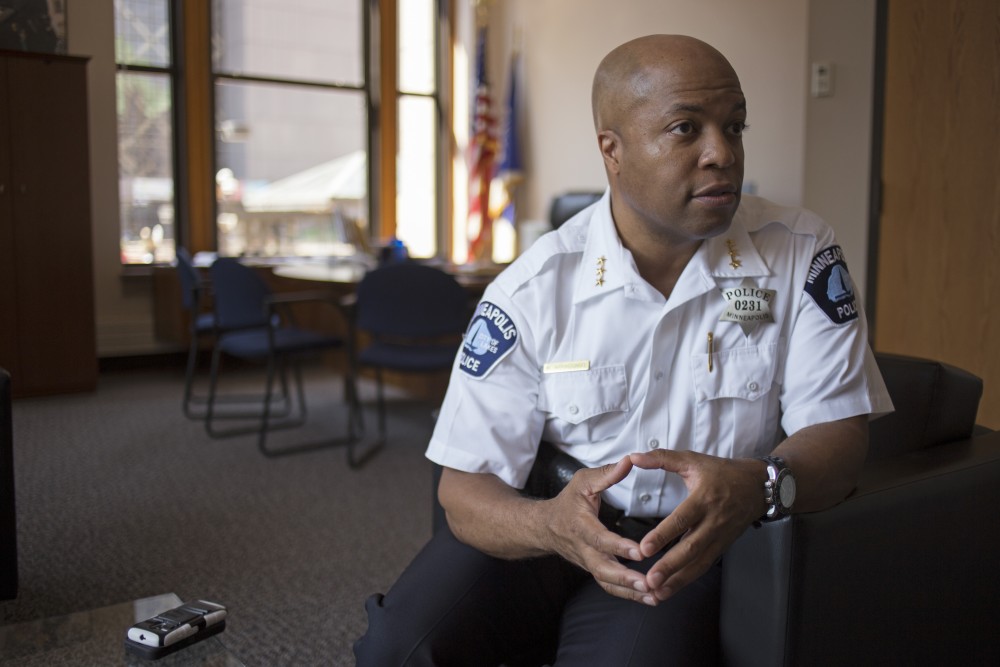Medaria “Rondo” Arradondo will be sworn in Friday as chief of a department he’s aided for nearly 30 years.
Arradondo took over as acting police chief for the Minneapolis Police Department in July after the resignation of former chief Janeé Harteau following the fatal shooting of Justine Damond. As chief, he plans to continue MPD’s collaboration with the University of Minnesota Police Department and implement new policies within his department.
Arradondo — MPD’s first African American police chief — started working for the department in 1989 as a patrol officer. He worked his way through the ranks over the years, holding various positions including inspector of the 1st Precinct, commander of the Internal Affairs Unit, deputy chief, assistant chief and more.
University Police Chief Matt Clark worked alongside Arradondo during his 22-year career at the Minneapolis Police Department.
Arradondo values the working relationship between both departments, Clark said, and his “personable, easy-going” attitude makes him a good colleague.
“One of the key things with a university is that you have to have a relationship with other law enforcement agencies,” he said. “Because of our location, we work with a number of agencies, the Minneapolis police being the most high-profile.”
Training for accountability on campus, throughout the city
One component of this relationship involves the training officers receive. Arradondo said implicit bias training is a main focus for the department.
Implicit bias training deals with addressing the associations officers make in relation to a person’s race, gender, age or sexual orientation, according to the National Initiative for Building Community Trust and Justice, of which MPD is a member.
UMPD will also participate in the training soon, Arradondo said.
“One of our big focuses is working on implicit bias, how humans interact,” Clark said.
But Dave Bicking of Communities United Against Police Brutality said this approach misses the point.
“It’s the explicit bias that needs to be addressed,” Bicking said. “That comes out in action; that’s what racial profiling is.”
Arradondo said joint training and collaborations help MPD better respond to campus incidents.
“[Joint training is] important because in the event that we’d ever have to respond to the University, our officers would have the familiarity and layout of the campus,” Arradondo said. “They invite us to many of the social events to get to know their teams and their partnerships and vice-versa.”
New tools, new policies to come
Arradondo has been busy rolling out new policies and programs designed to build community trust and police accountability since he took over. Most notably, he announced a new policy requiring officers to turn on their body cameras when responding to any call.
“He’s a global thinker in terms of what’s going on nationally and internationally, but he still takes on a local stance,” Clark said.
Arradondo and MPD unveiled a new data dashboard system in August after data collection began last November.
The program lets community members search for police stops by types of interaction and neighborhood, race and gender of the suspicious person. Officers must log this data before proceeding to each stop.
“That was something that the community had asked for; those were very important engagements and interactions police officers had with the community,” Arradondo said. “And so we are able to share that, and I think it’s actually a very good tool and builds transparency.”
Michelle Gross, president of Communities United Against Police Brutality, said the new program is good for transparency, but added her organization hopes police complaint data will also become available online.
“We always want information to be open to the public and available,” Gross said.
Arradondo plans to release his mission statement in the near future, which he said will build on policies and goals already in place from Janeé Harteau’s 2013 MPD 2.0 program.
“While I will not abandon those things from 2.0, because they’re a really good starting point, we will evolve,” Arradondo said.
















